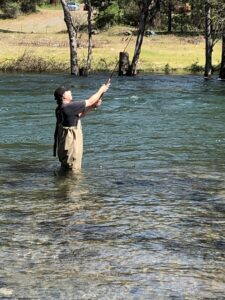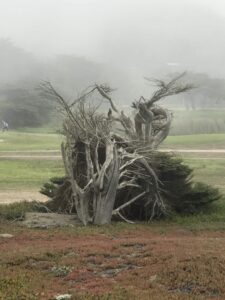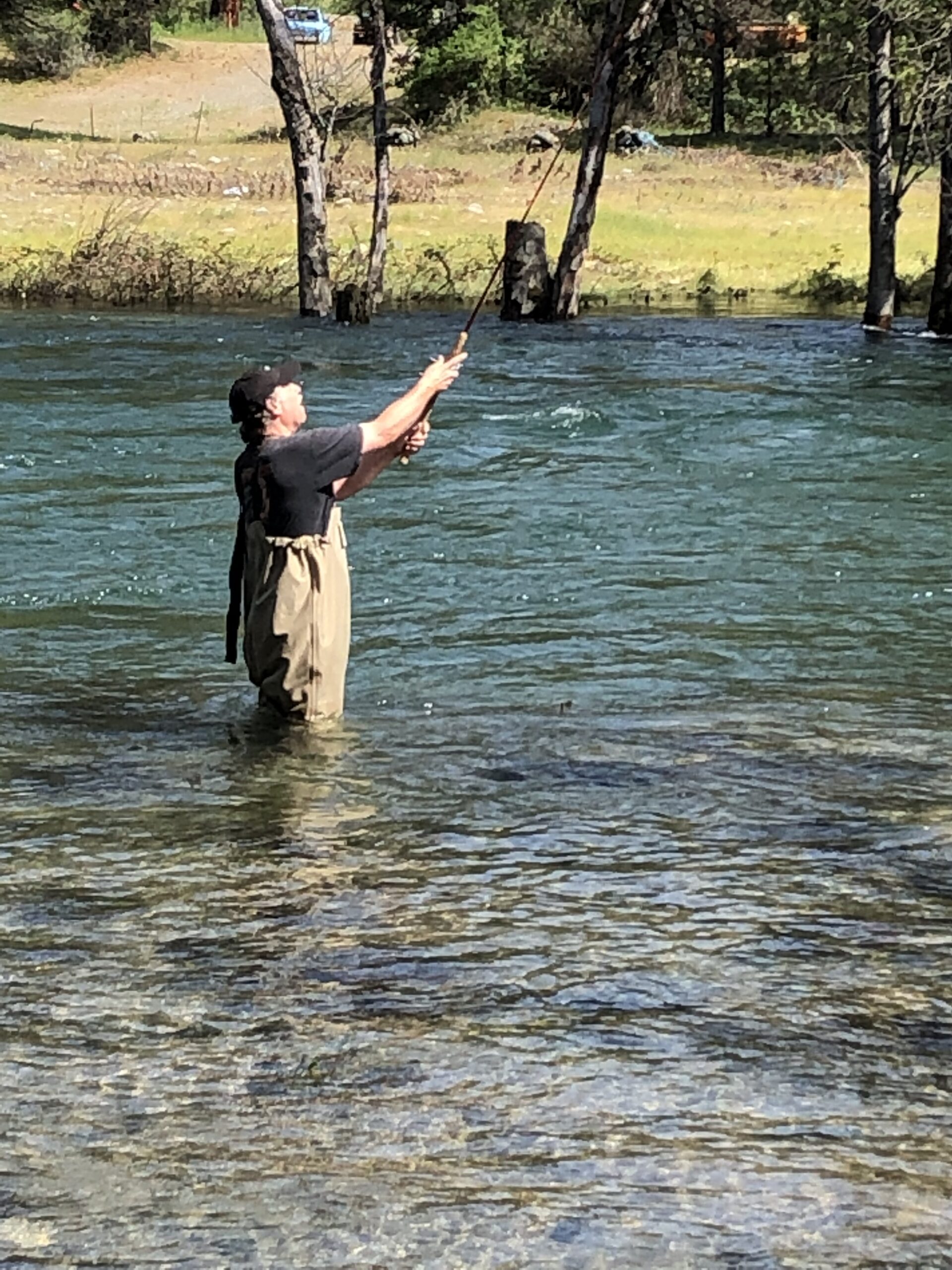Lora’s introduction
Wayne Spiggle is my step-father, but I cannot define our relationship by blood alone. I know Wendell Lee Brown, my biological father, who was killed in Vietnam, is at peace knowing that such a man of quality took over his parental responsibilities. Lee Brown is Daddy. Wayne Spiggle is Dad.
We’ve gone through many changes since he married my mom in 1973. I have ignored him, hoping he would disappear, hated, and loved him. As I matured, I started to appreciate the effort that he and my mother spent exposing us to different life experiences—other cultures, theater, and environmental problems to name a few. My parents led by example recycling, composting, and using solar energy. We did community service—visiting the deaf and blind school, picking up trash, participating in church and school fund raisers, and so on. We went to the Kennedy Center, listened to Luciano Pavarotti, and watched Zero Mostel. We were encouraged to develop our own passions—piano, singing, writing, and so on. We were forced to do hard work (weeding, mucking out the barn, and picking up rocks in the fields so they wouldn’t ruin the tractor’s mower blade), which I did not understand.
I took these lessons, these gifts, for granted. I thought everyone had the same experiences—the same love and support from their parents, the same exposure. Until I had my own children, I thought I was born disciplined, empathetic, hardworking, and adept in social situations, even though I don’t really enjoy them. Dad made us answer the phone, “Hello, Dr. Spiggle’s residence.” I thought that was pompous and arrogant, but it taught me to be polite, professional, and respectful at a young age. A skill I didn’t even recognize I had until I saw the lack of it in my own children, which I knew I’d failed to teach them. I was also taught to listen to my inner voice. Now, I question, not for the sake of questioning, to identify the truth. I value family and friends. I’m grounded and honest. I love. My most valued gift though is an overwhelming, burning need to make a difference. Although I rarely feel I’ve made any difference at all, the need never fades or subsides and gives my life a higher purpose.
As a result of my Dad’s influence, I don’t want to be important, but I do want to matter. I hope one day to leave a legacy worth remembering, and I have my Dad to thank for that.
Wayne’s history
Wayne Campbell Spiggle Jr. was born in Davis, West Virginia on September 1, 1934. His father, Wayne Campbell Spiggle, was born in 1906 and died at age 64 from Leukemia. While his mother, Lenora Spiggle, died when he was six years old. His father was a funeral director in a very poor, rural town. He received his elementary education in public schools. He earned an undergraduate degree in Agriculture from Berea College and a medical degree from the Medical College of Virginia. His 42 years of marriage, and counting, to Betty Spiggle started on May 27, 1973. Each brought three children to their marriage: Lynn, Sheryl, and Jennifer Spiggle, and Lora, Lee, and Dianne Brown. They share 11 grandchildren, Jacob, Elliot, Andi Jo, Nick, Kendall, Amber, Alyssa, Eliza, Ashlee, Ben, and one great grandchild, Finn.
Wayne’s vocation is primary care, internal medicine. He is also interested in social justice issues, particularly those impacting health care, the environment, and economic development. He enjoys farming and saving the world, no lie.
Rather than include all his activities, accolades, and professional and community activities, I asked Dad what contributions give him with the most pride. He said he was most proud of the following: the annual faculty award given to him by the senior class at University of Maryland; the work he did organizing the community to lobby for regulating strip mining coal in Maryland; his participation in forming Alleghany Health Right, an organization where doctors accept an equal share of patients who cannot afford to pay; and WVRx, West Virginia’s Statewide Charitable Mail Order Pharmacy that aims to provide free prescription drugs to the uninsured.
Wayne’s story
Challenges
As a boy, disaster threatened from World War II and poverty loomed in my future. My father struggled to keep poverty at bay, to provide food, shelter, and clothing for us.
In high school, I realized I needed to develop a skill in order to secure a future for myself and my future family, so I applied to Berea College. The day I received the acceptance letter from Berea College changed the course of my life. Getting into college today is not as important to the average young person’s basic survival. It was a big deal for me. It was my ticket out of poverty. Berea College is a special school with a unique mission.
“Berea College, founded by ardent abolitionists and radical reformers, continues today as an educational institution still firmly rooted in its historic purpose ‘to promote the cause of Christ.’ Adherence to the College’s scriptural foundation, ‘God has made of one blood all peoples of the earth,’ shapes the College’s culture and programs so that students and staff alike can work toward both personal goals and a vision of a world shaped by Christian values, such as the power of love over hate, human dignity and equality, and peace with justice. This environment frees persons to be active learners, workers, and servers as members of the academic community and as citizens of the world. The Berea experience nurtures intellectual, physical, aesthetic, emotional, and spiritual potentials and with those the power to make meaningful commitments and translate them into action.” Learn more about Berea College.
The Berea College mission coincided with the ideals my father instilled in me. Simply, all human beings deserve respect and fair treatment. Period. Economic status, race, and other characteristics must not factor in to whether a person deserves to be treated with respect.
Poverty was a real concern and a big challenge for my father. He was forced to balance his need to make a living with his values. His values won at the expense of my family’s well-being sometimes. If a family could not afford to pay to bury their loved ones, he accepted modest tokens instead. Thankfully, my children and grandchildren have never felt the threat of poverty looming. When I was accepted to Berea, I was given the chance to prevent poverty from touching my life.
After I started my studies at Berea, another experience helped me to direct my focus. Berea College is a work school. You don’t pay tuition. For my first job, I worked in the dairy barn. One day, I was driving a few cows down the road past the creamery. The creamery sold dairy products—both retail and wholesale. People bought cheese, ice cream, and milk at the creamery.
While driving the cows past the creamery, the college admissions officer, Alan T. Morriam, walked out the front door. I knew who Mr. Morriam was, but I was very surprised that he knew me. He stopped me, a little freshman, and said, “I need to talk to you. You’re Wayne Spiggle, the boy from Tucker County, West Virginia.” I thought, “Now, how does he know who I am?” I said, “Yes, sir. I’m Wayne Spiggle.” Mr Morriam said, “I want you to know something. You have the worst record of anyone I’ve ever admitted to Berea College. I’m going to be watching you.”
I had a visceral reaction to his threat—anger and fear. First off, I was mad as hell that he would stop me and state his concerns in those terms. I felt it was unfair, almost as though he didn’t care. My second feeling was fear. His statement challenged my sure-thing ticket to avoiding a poverty-stricken future, putting my plan and future in jeopardy.
My conversation with Mr. Morriam changed how I approached my studies. I was in a Biology class with premed students. Each one was arrogant and treated the rest of us with disdain. This motivated me more. I switched to high gear studying biology with Professor Hull. With the threat of failure and losing my future hanging over me, I focused my energy on improving my record. I passed Biology with an A. After that experience, I started to score As regularly. I discovered it was easier to score an A when I had the reputation as an A student. Those times were high points in my early education.
My struggles began after I realized that agriculture was not my passion. With a degree in agriculture and three acceptance letters to veterinary school, I realized I wasn’t excited to attend veterinary school. It didn’t feel right. I began to visit the chapel on campus. Danforth Chapel was built by the wealthy Danforth family, philanthropists to the college. Every day for two weeks, I prayed in the chapel. Daily meditation helped me to change the direction of my education. After two weeks, I decided not to accept my appointment to veterinary school but to attend medical school instead. My switch from studying to be a veterinarian to doctor meant I must attend Berea College for an extra year, which was not done at the time. Even worse though, I had to tell my father I was turning down those appointments.
My dad was upset by the news. Floyd, my uncle, earned several degrees but was unable to make any of them work. Dad was not supportive, because he was thinking about his brother. He wanted to protect me from failure. However, Berea was supportive and allowed me to stay on campus and complete another year in premed studies.
After that year, I was accepted into West Virginia University Medical School. At that time, it was still a two-year medical school. Medical students studied onsite in Morgantown, WV the first two years, and the last two years we studied at medical schools in either Virginia or Pennsylvania. My class was the final two-year class, which meant that the school was transitioning to a four-year curriculum, building a new facility, and hiring new faculty. It was a bad time to study medicine at WVU. Everyone was focusing on the future. New faculty and old faculty were at each other’s throats vying for position.
At least twelve potentially wonderful young physicians quit, they couldn’t take the pressure. My ability to cope with the pressure was poor, near the bottom of the class. I battled fear and anxiety, waking in the middle of the night in a cold sweat, heart pounding, and panicked. It was a grueling two years. I was angry, because I knew it wasn’t necessary. Each day was a test, and I woke up thinking, “Am I going to make it?”
Finding My Way
My last two years studying at the Medical College of Virginia were easier. I boarded at a psychiatric hospital and received a small stipend doing histories and physicals. Every Saturday, an old, German psychiatrist performed electroshock treatments. My job was to properly sedate the patients for the treatments. Anesthetizing a patient is a delicate process and a true art. Electroshock treatment makes the patient less aggressive and the effect lasts for two years. I think there is still a place for electroshock treatment in acutely psychotic cases.
I also did a rotating internship at Charleston Medical Hospital in Charleston, WV, which put me in different settings—the emergency room, hospitals, and traditional offices. Sadly, internships aren’t required anymore. My first rotation started in the emergency room. My job was to supervise and manage the emergency room and staff. As my first order of business, I called a meeting with the nursing staff. I told them, “I don’t know what I’m doing yet. You tell me what to do, and please don’t let me make any mistakes.” That meeting started things off right. After that, I enjoyed my rotations and learned a great deal. During my first rotation, I was asked to sew a large laceration on a patient’s leg. In those days, a physician in early training would not be asked to sew up such a severe laceration, but since I was practiced from my experience in the medical hospital, I took it on. I was still frightened that I would not do it correctly. In fact, I was certain it would come apart, but it held.
For my last residency, I organized a few colleagues to work out of the new building at WVU. I have a knack for organizing. During that residency, I learned to practice medicine. My partner was a man from South America. He was a year ahead of me. He was an intelligent fellow, learned English from text books, and thought out of the box like me. Each day, very early, we held meetings with the nursing staff. The night shift nurses briefed the day shift nurses before they left the hospital. We directed the meetings, collaborating with the nurses to provide our patients with the best care.
My partner and I became friends and colleagues, adept at working around the system to get our patients the care we thought they needed. For example, we had a patient in her sixties who had continuous episodes of complete heart block. During complete heart block, the patient’s heart rate falls into the 30s and 40s, and their brain does not get enough oxygen. The patient can have seizures. In that case, we take the patient to ICU and give them a shock. If we are lucky, the rhythm comes back. At that time, the pacemaker had just been invented. We wanted our patient to have a pacemaker. The chief doctor thought it was too dangerous, so we waited until the weekend and had one implanted. She lived, and we loved to see her at the clinic.
Lessons Learned
I’ve learned that you don’t need to be smart to be successful. However, you must be disciplined and committed. Without discipline and commitment, forget it. The lackadaisical, undisciplined person fails where a person with average intelligence, discipline, and commitment, who holds himself to a higher standard than he believes he can achieve, achieves it.
I’m still driven to make a difference. The difference I’ve made came in a different package than I expected. My dream was to become a politician and help change the face of poverty in Appalachia. When I first started thinking about these things (in college), Appalachia was described as the richest in terms of environmental resources and the poorest in terms of human welfare. That is still an accurate description with its roots in the fact that the majority of its resources are in absentee ownership and they control the government. While I did become a politician, I did not have sufficient power to make such a change. My vision for my life did not materialize. I’m only beginning to accept that. I don’t need to go down in history to do something significant. Every bit I can do for others adds up. I should be satisfied with what I’ve done, but I’m not. I wonder, “Why didn’t I do something worthwhile?” I feel like I haven’t done enough with my life. But taken in the light of kindnesses, I can’t judge.
Since I prayed in Danforth Chapel, I’ve done nothing on my own. As far as medicine and life is concerned, I’ve had a Spiritual Partner. Since Betty and I married, I’ve also had her partnership. Betty takes a great deal of the leadership in that partnership. I often feel that I’m not doing enough to be an equal partner with her. I feel it more because she shows no resentment for my shortcomings, which fills me with a sense of relief and appreciation. She could be a crab, but she’s not. She has every right to be crabby. She’s the only woman in my life who gives me positive vibes almost all the time. I’m the beneficiary of her love. I don’t feel that she’s getting a fair shake.
I can’t judge the merit of what I’ve done. Without the reassurance of my children, I would feel like a failure as a parent. It makes me proud to see the light my children carry, the commitment to their values. It makes me very proud. The best part is that I know they do it for the sake of doing the right thing, not for personal gain. When my kids reach out to me and thank me for the parenting I’ve done, I feel soothed.
I do feel proud of the way I’ve lived my life. Why? Because I see how my life is reflected in the lives of others. I remember when you (Lora) used to hate to walk down the street with me or your mother, because everyone stopped to say, “Dr. Spiggle, you treated my mother, brother, or sister. Thank you.” My political friend, John Hunter, was running for Senate. I went door-to-door with him to help with his campaign. He went down one side of the street. I went down the other. After three blocks, John said, “By God, Wayne, you’ve taken care of everybody’s mother in Keyser.”
Relationships
I’m blessed to have good relationships with most people in my life. My only failed relationship right now is my relationship with my ex-wife. I admit being married to me is not easy. We had a stormy relationship. I have forgiven her for what she did to me, but she took my children from me and put them in an unacceptable situation. Her choice, from my standpoint, hurt my three daughters. I cannot forgive her for what she did to my children.
I don’t have problematic relationships with anyone else. What I get out of relationships is a sense of appreciation for friendships and fellowship. I should do a better job of having more relationships in my older age than I do. But I have a variety of groups I participate in and each one provides me with good friendships.
I feel like I have a responsibility to act when I see other people taking advantage of their fellow man. It happens all the time with our failed political system. The way we conduct business in this country encourages this behavior. It’s not unique to the United States. It’s the same old story—the rich get richer and the poor get poorer. It’s an injustice I still feel moved to challenge.
Another joy that is being lost to our young people is the value of physical work. I wonder how our children will live fulfilled lives without an appreciation for manual labor. Having said all that though, “What the hell do I know?”
Life after Death
Starting back in Danforth Chapel, my relationship with My Creator has been an important part of my life. I consider the Bible to be a sacred book, as is the Koran, a book written by people. It deserves to be called sacred. It is part of the human experience and related to our relationship with God, but it is not infallible. We Christians approach religion differently. People think that everything in the Bible came directly from God. Everything in the Bible came from the minds and hands of human beings.
In terms of life after death, when you lose brain function, you’re dead. Brain function does not come back. The only life after death is my memory of the deceased. My dad is alive because I remember him. He is active because of that memory, but I’m never going to see him again. That’s okay. I don’t worry about the afterlife, but I do worry about the process of dying. We are in a very dangerous phase in our culture that is devoted to prolonging the dying process. A lot of suffering comes from that. If there is some sort of awareness after death, I don’t believe in it. Awareness requires brain function. If there is some sort of sublime awareness that follows death, so be it. It isn’t necessary for me to believe in it to benefit from it. What will be will be.




